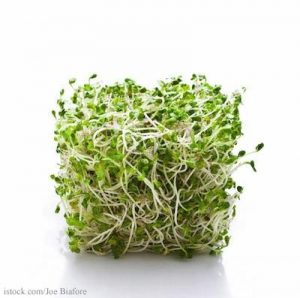E. coli lawsuit questions and answers about chronic food poisoning outbreaks linked to alfalfa sprouts were fielded this week by a roundtable of lawyers in the Minneapolis offices of Pritzker Hageman, a national firm that practices extensively in the area of foodborne illness litigation.
The discussion, conducted by Food Poisoning Bulletin, centered on two multi-state, sprout-related outbreaks of Salmonella and E. coli in 2016. The latest of the outbreaks was uncovered by the Minnesota Department of Health and investigated by FDA and the Centers for Disease Control and Prevention (CDC). On March 2, the CDC reported that seven Minnesotans and two residents of Wisconsin were infected by the same strain of E. coli O157, traced to alfalfa sprouts grown at Jack & the Green Sprouts of River Falls, Wisconsin. Two of the victims were hospitalized and the company recalled its alfalfa and alfalfa onion sprouts.
Q: In the past two decades, the CDC has documented 30 multi-state outbreaks of food poisoning linked to contaminated raw sprouts. What makes sprouts so dangerous?
A: The great paradox about sprouts is that consumers perceive them as nutritious and wholesome while food scientists see them as vectors for harmful bacteria. It’s often the case that the seeds are contaminated with E. coli or Salmonella at levels so low that the germs are hard to detect. When placed in warm, humid growing conditions, the pathogens greatly multiply into infectious doses but can’t be seen or smelled. Finally, sprouts are promoted as a raw health food; so there’s no cooking step to kill the microscopic bugs.
 Q: Can I sue a restaurant for E. coli in alfalfa sprouts?
Q: Can I sue a restaurant for E. coli in alfalfa sprouts?
A: Yes. If you are diagnosed with an E. coli infection and your illness is identified as part of an outbreak through PFGE or whole genome sequencing, you can sue. Every entity along the food chain is responsible for making sure that food isn’t contaminated with enough pathogens to make you sick.
Q: If raw sprouts are so dangerous, why are they perceived as good for you?
A: These products have been seen as health food for many years. But they are inherently dangerous because the bacteira can be encapsulated in the seed. Growing conditions for these products are also perfect for bacterial growth: lots of moisture and warmth. These products should carry a warning label.
Q: On what legal foundation can you file an alfalfa sprout E. coli lawsuit?
A: On behalf of our clients, we base our legal claims on the fact that contaminated sprouts are defective products. If we prove they are defective, we have done our job. In some cases where we have pushed for punitive damages, we find that companies sell food knowing that it is defective. Punitive damages are above and beyond. They are meant to punish wrongdoers for being reckless, careless and law-breaking when it comes to making or selling food. The important thing for our clients is the role their lawsuit plays in making food safer for other people. When you are hospitalized or a loved one is killed from a toxic bacterial infection from eating food, you want justice for your family and the multi-million dollar verdicts or settlements that sometimes result send an undeniable message to the food and restaurant industry to clean up their acts.




